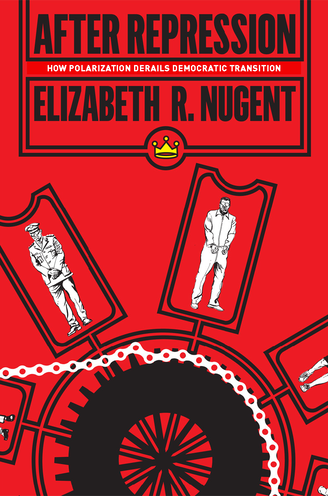After Repression: How Polarization Derails Democratic Transition
Princeton Studies in Political Behavior
Winner, Robert A. Dahl Award (2022)
Given by the American Political Science Association for an untenured scholar
who has produced scholarship of the highest quality on the subject of democracy
Honorable Mention, Luebbert Book Award (2022)
Given by the American Political Science Association for the best book in the field of comparative politics
Available through Princeton University Press and Amazon
Princeton Studies in Political Behavior
Winner, Robert A. Dahl Award (2022)
Given by the American Political Science Association for an untenured scholar
who has produced scholarship of the highest quality on the subject of democracy
Honorable Mention, Luebbert Book Award (2022)
Given by the American Political Science Association for the best book in the field of comparative politics
Available through Princeton University Press and Amazon

Democratic transition stalls when compromise fails. Political polarization among elite actors has profound consequences for cooperation, yet existing theories fail to explain why party systems emerge more or less polarized from authoritarianism. After Repression presents a theory of polarization under authoritarianism, highlighting the repression that defines these contexts. Repression first influences how opposition actors come to identify themselves, and these identities then shape the landscape of affective bonds and articulated preferences among groups. The nature of repression determines its effect; widespread repression creates bridging political identities and decreases polarization, while targeted repression increases in-group identification for repressed groups and increases polarization.
In After Repression, I document repression and polarization among the opposition in Egypt and Tunisia prior to the Arab Spring, drawing on extensive original interview and historical data. Tunisia is an example of widespread repression and decreasing polarization among the opposition under president Zine el-Abidine Ben Ali. Egypt demonstrates targeted repression, overwhelmingly carried out against the Muslim Brotherhood, and increasing polarization among the opposition under president Hosni Mubarak. The book also includes lab experimental evidence testing the psychological mechanism through which repression shapes identities and polarization, and discusses how low polarization at the outset of transition helps explain why elites in Tunisia were able to compromise, cooperate, and continue on the path towards democratic consolidation, while deeply polarized elites in Egypt contributed to the rapid retrenchment of authoritarianism.
Media
Tahrir Podcast
"After Repression: A conversation with Elizabeth Nugent" on POMEPS Middle East Political Science Podcast
"Forging Democracy Out of the Trauma of Repression" on Scope Conditions Podcast
Audio recording of presentation at Harvard Kennedy School's Belfer Center
Interview with Yale's MacMillan Report
Summary of the project in Le Diplomate Tunisien (French language)
Summary of the project in Yale News
Reviews
By Lisa Anderson in Foreign Affairs
By Nathan Brown in Perspectives on Politics
By Killian Clarke in Mediterranean Politics
By Kira Jumet in International Journal of Middle East Studies
By Ilker Kalin in The Rest: Journal of Politics and Development
By Gary Stradiotto in Political Science Quarterly
By Daniel Tavana in Democratization
In After Repression, I document repression and polarization among the opposition in Egypt and Tunisia prior to the Arab Spring, drawing on extensive original interview and historical data. Tunisia is an example of widespread repression and decreasing polarization among the opposition under president Zine el-Abidine Ben Ali. Egypt demonstrates targeted repression, overwhelmingly carried out against the Muslim Brotherhood, and increasing polarization among the opposition under president Hosni Mubarak. The book also includes lab experimental evidence testing the psychological mechanism through which repression shapes identities and polarization, and discusses how low polarization at the outset of transition helps explain why elites in Tunisia were able to compromise, cooperate, and continue on the path towards democratic consolidation, while deeply polarized elites in Egypt contributed to the rapid retrenchment of authoritarianism.
Media
Tahrir Podcast
"After Repression: A conversation with Elizabeth Nugent" on POMEPS Middle East Political Science Podcast
"Forging Democracy Out of the Trauma of Repression" on Scope Conditions Podcast
Audio recording of presentation at Harvard Kennedy School's Belfer Center
Interview with Yale's MacMillan Report
Summary of the project in Le Diplomate Tunisien (French language)
Summary of the project in Yale News
Reviews
By Lisa Anderson in Foreign Affairs
By Nathan Brown in Perspectives on Politics
By Killian Clarke in Mediterranean Politics
By Kira Jumet in International Journal of Middle East Studies
By Ilker Kalin in The Rest: Journal of Politics and Development
By Gary Stradiotto in Political Science Quarterly
By Daniel Tavana in Democratization